In a pivotal shift within Germany’s political landscape, the centre-right Christian Democratic Union (CDU) and its Bavarian sister party, the Christian Social Union (CSU), have emerged victorious in the recent federal elections. Led by Friedrich Merz, the CDU/CSU alliance secured approximately 28.5% of the vote, positioning Merz as the likely successor to Chancellor Olaf Scholz. This election not only underscores a conservative resurgence but also highlights significant gains by the far-right Alternative für Deutschland (AfD), which garnered about 21% of the vote, marking its strongest performance to date.
A Conservative Resurgence
The CDU/CSU’s return to prominence can be attributed to several factors, including voter fatigue with the incumbent government and a campaign that resonated with concerns over national security, economic stability, and immigration. Friedrich Merz, a seasoned politician known for his pro-business stance, capitalized on these issues, promising a return to traditional values and a robust economic agenda. Despite securing the largest share of votes, the CDU/CSU’s 28.5% reflects the second-worst post-war result for the bloc, indicating a fragmented political environment.
The AfD’s Surge
The AfD’s ascent to approximately 21% of the vote has sent ripples through Germany and the broader European community. Doubling its previous share, the AfD’s success is indicative of a growing segment of the electorate gravitating towards nationalist and anti-immigration platforms. This surge presents a complex challenge for traditional parties, as mainstream political entities have consistently ruled out coalitions with the AfD, citing fundamental ideological differences.
SPD’s Historic Decline
The Social Democratic Party (SPD), led by Chancellor Olaf Scholz, experienced a significant downturn, capturing just over 16% of the vote—its poorest performance since 1887. Analysts attribute this decline to various factors, including internal divisions, policy criticisms, and a perceived disconnect with the working-class base. Scholz acknowledged the defeat, stating, “This time the election result is bad, and that is why I am also responsible for this election result.”
Coalition Considerations
With no party achieving an outright majority, coalition negotiations are imperative. Merz faces the intricate task of forming a stable government, with potential partners including the SPD and the Greens, who secured around 12% of the vote. However, the SPD’s reluctance to enter another grand coalition and policy divergences with the Greens may complicate discussions. All mainstream parties have categorically excluded the possibility of collaborating with the AfD, further narrowing coalition options.
Merz’s Vision for Germany
Friedrich Merz has articulated a vision centered on economic revitalization, stringent immigration policies, and a reevaluation of Germany’s foreign alliances. Notably, he has advocated for Europe to achieve greater independence from the United States, reflecting a desire for a more autonomous European stance in global affairs. This perspective may signal forthcoming shifts in Germany’s foreign policy and its role within the European Union.
Implications for Europe
The election outcomes in Germany, Europe’s largest economy, are poised to have substantial repercussions across the continent. The CDU/CSU’s victory, coupled with the AfD’s rise, may influence policy debates on immigration, economic integration, and the EU’s future direction. European leaders are closely monitoring Berlin as coalition talks progress, cognizant that Germany’s political trajectory will invariably impact the broader European project.
Conclusion
Germany stands at a crossroads, with the recent elections encapsulating a nation grappling with questions of identity, economic direction, and its place on the world stage. As Friedrich Merz and the CDU/CSU navigate the complexities of coalition-building, the choices made in the coming weeks will shape the country’s path forward and reverberate throughout Europe.





